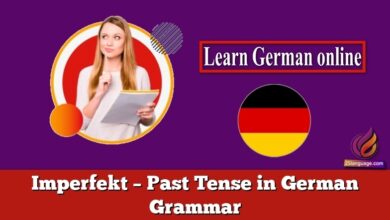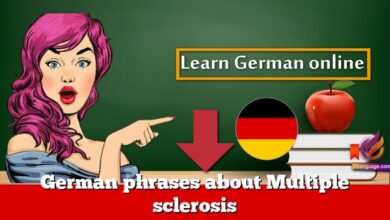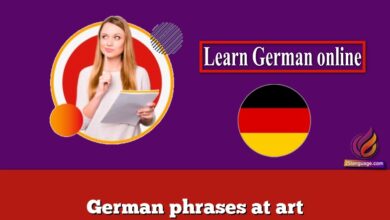Simple Past Tense in German
The Basics of German Past Tense

German past tense. Do you love reading novels or newspapers? If yes, you need to know everything about German past tense! Unlike English, there are 2 past tenses in German- the simple past tense and the present perfect tense. If you have already mastered the perfect tense, then simple past tense is actually quite simple!
German Past Tense
The simple past tense is also referred to as “Imperfect tense.” It is known as Präteritum in German. Usually, German past tense is used in written language. For instance in novels, newspapers, reports and magazines. It is also used while narrating stories.
During informal situations, simple past tense can be replaced by present perfect tense in spoken language. However, helping verbs (haben, sein and werden) and modal verbs are always used in their past tense forms even in spoken German.
Now that you know when to use the German past tense, let’s learn how to conjugate different types of verbs.
How to Conjugate Verbs in German Past Tense
You all must be aware that German verbs are divided into different categories. Just like other tenses, even in simple past tense, the conjugation of verbs slightly changes depending on the category.
So, the very first step is to identify the type of verb.
Weak Verbs
The conjugation of weak or regular verbs is easy because they follow a standard pattern. The simple past tense of these verbs is constructed by adding suffix ‘-te’ to the verb stem + the personal endings. Consider the verb lernen.
Past tense form = lern + te + personal endings
For verb stems ending in -d, -t, -m or –n, we add an ‘-e’ between the verb stem and the suffix –te. Consider the verb warten.
Past tense form = wart + e + te + personal endings
Conjugations of a few Weak Verbs:-
lernen (to learn)
| Person | Conjugation |
| ich | lernte |
| du | lerntest |
| er/ sie/ es | lernte |
| wir | lernten |
| ihr | lerntet |
| sie/ Sie | lernten |
machen (to make)
| Person | Conjugation |
| ich | machte |
| du | machtest |
| er/ sie/ es | machte |
| wir | machten |
| ihr | machtet |
| sie/ Sie | machten |
warten (to wait)
| Person | Conjugation |
| ich | wartete |
| du | wartetest |
| er/ sie/ es | wartete |
| wir | warteten |
| ihr | wartetet |
| sie/ Sie | warteten |
lachen (to laugh)
| Person | Conjugation |
| ich | lachte |
| du | lachtest |
| er/ sie/ es | lachte |
| wir | lachten |
| ihr | lachtet |
| sie/ Sie | lachten |
reisen (to travel)
| Person | Conjugation |
| ich | reiste |
| du | reistest |
| er/ sie/ es | reiste |
| wir | reisten |
| ihr | reistet |
| sie/ Sie | reisten |
Did you notice any similarities? Well, we are sure you did!
Be it any kind of verb, the first and third person singular forms do not take any endings. They are always the same.
Strong or irregular verbs do not follow a standard pattern. The past tense of these verbs is formed without the suffix ‘-te‘. Also, the whole verb stem changes. Personal endings (either -st, -en, -t or no ending) are added after the changed verb stem.
The best way to remember the German past tense forms of all the strong verbs is to memorize them. But, not all at once! Only a few at a time!
Conjugations of a few Strong Verbs:-
geben (to give)
| Person | Conjugation |
| ich | gab |
| du | gabst |
| er/ sie/ es | gab |
| wir | gaben |
| ihr | gabt |
| sie/ Sie | gaben |
fahren (to drive)
| Person | Conjugation |
| ich | fuhr |
| du | fuhrst |
| er/ sie/ es | fuhr |
| wir | fuhren |
| ihr | fuhrt |
| sie/ Sie | fuhren |
helfen (to help)
| Person | Conjugation |
| ich | half |
| du | halfst |
| er/ sie/ es | half |
| wir | halfen |
| ihr | halft |
| sie/ Sie | halfen |
schreiben (to write)
| Person | Conjugation |
| ich | schrieb |
| du | schriebst |
| er/ sie/ es | schrieb |
| wir | schrieben |
| ihr | schriebt |
| sie/ Sie | schrieben |
trinken (to drink)
| Person | Conjugation |
| ich | trank |
| du | trankst |
| er/ sie/ es | trank |
| wir | tranken |
| ihr | trankt |
| sie/ Sie | tranken |
Helping Verbs
These are the most commonly used irregular verbs even in spoken German. The conjugations of helping verbs are as follows:-
haben (to have)
| Person | Conjugation |
| ich | hatte |
| du | hattest |
| er/ sie/ es | hatte |
| wir | hatten |
| ihr | hattet |
| sie/ Sie | hatten |
sein (to be)
| Person | Conjugation |
| ich | war |
| du | warst |
| er/ sie/ es | war |
| wir | waren |
| ihr | wart |
| sie/ Sie | waren |
werden (to become)
| Person | Conjugation |
| ich | wurde |
| du | wurdest |
| er/ sie/ es | wurde |
| wir | wurden |
| ihr | wurdet |
| sie/ Sie | wurden |
Mixed Verbs
The simple past tense of mixed verbs is a combination of strong and weak verbs. This means, the verb stem changes like strong verbs, and we also add the suffix ‘-te’ after the verb stem just like weak verbs. Modal verbs too are categorized as mixed verbs.
Conjugations of a few Mixed Verbs:-
bringen (to bring)
| Person | Conjugation |
| ich | brachte |
| du | brachtest |
| er/ sie/ es | brachte |
| wir | brachten |
| ihr | brachtet |
| sie/ Sie | brachten |
rennen (to run)
| Person | Conjugation |
| ich | rannte |
| du | ranntest |
| er/ sie/ es | rannte |
| wir | rannten |
| ihr | ranntet |
| sie/ Sie | rannten |
können (to be able to)
| Person | Conjugation |
| ich | konnte |
| du | konntest |
| er/ sie/ es | konnte |
| wir | konnten |
| ihr | konntet |
| sie/ Sie | konnten |
mögen (to like)
| Person | Conjugation |
| ich | mochte |
| du | mochtest |
| er/ sie/ es | mochte |
| wir | mochten |
| ihr | mochtet |
| sie/ Sie | mochten |
While conjugating these verbs in German past tense, the prefix is placed at the end of the sentence. Again, the rules of weak, strong and mixed verbs apply here as well.
Reading simple story books and online newspapers will definitely help you to remember the simple past tense forms of irregular verbs.





























